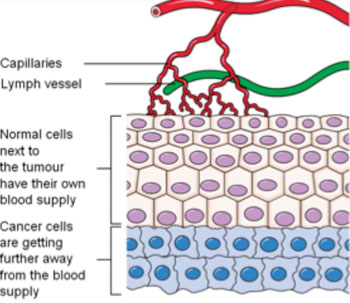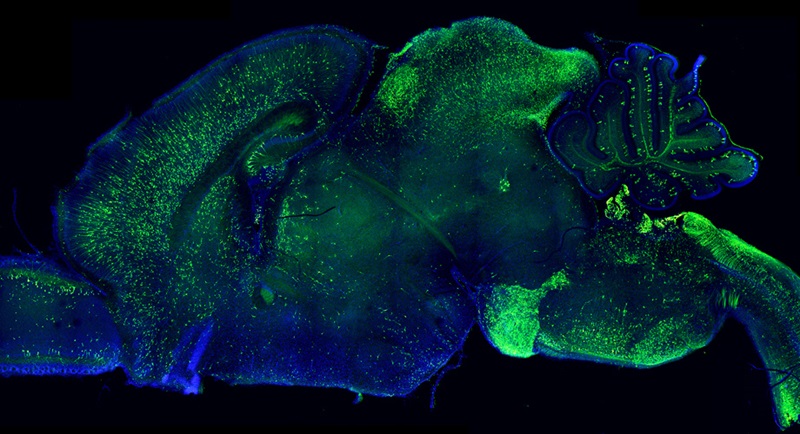Blocking the MicroRNA That Controls Angiogenesis Slows Breast Tumor Growth in a Diabetic Mouse Model
|
By LabMedica International staff writers Posted on 20 Sep 2015 |

Image: Without angiogenesis a tumor cannot grow beyond a limited size (Photo courtesy of Wikimedia Commons).
A team of molecular biologists demonstrated that it was possible to inhibit growth of breast tumors in a diabetic mouse model by injecting the animals with an antagonist of the microRNA (miRNA) that controls the process of angiogenesis (formation of new blood vessels).
Investigators at the Cleveland Clinic (OH, USA) had reported previously that angiogenesis in response to hyperglycemia in a cell- and tissue-specific manner was regulated by a novel pathway under the control of the microRNA miR-467. A microRNA is a member of the class of RNA fragments about 20 nucleotides long that block gene expression by attaching to molecules of messenger RNA (mRNA) in a fashion that prevents them from transmitting the protein synthesizing instructions they had received from the DNA.
In the current study, the investigators examined whether systemic administration of an antagonist of miR-467 would prevent hyperglycemia-induced local angiogenesis in a tissue-specific manner. To this end they studied the effect of the antagonist on hyperglycemia-induced tumor growth and angiogenesis and on skin wound healing in mouse models of diabetes.
They reported in the September 2015 issue of the FASEB Journal that the systemic injection of the antagonist prevented hyperglycemia-induced angiogenesis and growth of mouse and human breast cancer tumors, where the miR-467 pathway was active in hyperglycemia. In tissues where the miR-467–dependent mechanism was not activated by hyperglycemia, there was no effect of the antagonist: the systemic injection did not affect skin wound healing or the growth of prostate tumors. The antagonist did not have any effect on organs or tissues unaffected by increased blood vessel growth.
"Complications of diabetes are the main reason for mortality and hospitalization of diabetic patients. The advanced methods of measuring and regulation of the blood sugar levels resulted in deaths from diabetic coma being very rare, but the vascular complications remain an important problem that leads to mortality and loss of quality of life," said Dr. Olga Stenina-Adognravi, a researcher in the department of molecular cardiology at the Cleveland Clinic. "Developing a new organ-specific way to prevent and treat the vascular complications and cancer growth in diabetic patients is the goal of our work."
Related Links:
Cleveland Clinic
Investigators at the Cleveland Clinic (OH, USA) had reported previously that angiogenesis in response to hyperglycemia in a cell- and tissue-specific manner was regulated by a novel pathway under the control of the microRNA miR-467. A microRNA is a member of the class of RNA fragments about 20 nucleotides long that block gene expression by attaching to molecules of messenger RNA (mRNA) in a fashion that prevents them from transmitting the protein synthesizing instructions they had received from the DNA.
In the current study, the investigators examined whether systemic administration of an antagonist of miR-467 would prevent hyperglycemia-induced local angiogenesis in a tissue-specific manner. To this end they studied the effect of the antagonist on hyperglycemia-induced tumor growth and angiogenesis and on skin wound healing in mouse models of diabetes.
They reported in the September 2015 issue of the FASEB Journal that the systemic injection of the antagonist prevented hyperglycemia-induced angiogenesis and growth of mouse and human breast cancer tumors, where the miR-467 pathway was active in hyperglycemia. In tissues where the miR-467–dependent mechanism was not activated by hyperglycemia, there was no effect of the antagonist: the systemic injection did not affect skin wound healing or the growth of prostate tumors. The antagonist did not have any effect on organs or tissues unaffected by increased blood vessel growth.
"Complications of diabetes are the main reason for mortality and hospitalization of diabetic patients. The advanced methods of measuring and regulation of the blood sugar levels resulted in deaths from diabetic coma being very rare, but the vascular complications remain an important problem that leads to mortality and loss of quality of life," said Dr. Olga Stenina-Adognravi, a researcher in the department of molecular cardiology at the Cleveland Clinic. "Developing a new organ-specific way to prevent and treat the vascular complications and cancer growth in diabetic patients is the goal of our work."
Related Links:
Cleveland Clinic
Latest BioResearch News
- Genome Analysis Predicts Likelihood of Neurodisability in Oxygen-Deprived Newborns
- Gene Panel Predicts Disease Progession for Patients with B-cell Lymphoma
- New Method Simplifies Preparation of Tumor Genomic DNA Libraries
- New Tool Developed for Diagnosis of Chronic HBV Infection
- Panel of Genetic Loci Accurately Predicts Risk of Developing Gout
- Disrupted TGFB Signaling Linked to Increased Cancer-Related Bacteria
- Gene Fusion Protein Proposed as Prostate Cancer Biomarker
- NIV Test to Diagnose and Monitor Vascular Complications in Diabetes
- Semen Exosome MicroRNA Proves Biomarker for Prostate Cancer
- Genetic Loci Link Plasma Lipid Levels to CVD Risk
- Newly Identified Gene Network Aids in Early Diagnosis of Autism Spectrum Disorder
- Link Confirmed between Living in Poverty and Developing Diseases
- Genomic Study Identifies Kidney Disease Loci in Type I Diabetes Patients
- Liquid Biopsy More Effective for Analyzing Tumor Drug Resistance Mutations
- New Liquid Biopsy Assay Reveals Host-Pathogen Interactions
- Method Developed for Enriching Trophoblast Population in Samples
Channels
Clinical Chemistry
view channel
3D Printed Point-Of-Care Mass Spectrometer Outperforms State-Of-The-Art Models
Mass spectrometry is a precise technique for identifying the chemical components of a sample and has significant potential for monitoring chronic illness health states, such as measuring hormone levels... Read more.jpg)
POC Biomedical Test Spins Water Droplet Using Sound Waves for Cancer Detection
Exosomes, tiny cellular bioparticles carrying a specific set of proteins, lipids, and genetic materials, play a crucial role in cell communication and hold promise for non-invasive diagnostics.... Read more
Highly Reliable Cell-Based Assay Enables Accurate Diagnosis of Endocrine Diseases
The conventional methods for measuring free cortisol, the body's stress hormone, from blood or saliva are quite demanding and require sample processing. The most common method, therefore, involves collecting... Read moreMolecular Diagnostics
view channel
World’s First One-Minute Hepatitis C Antibody Test Facilitates Quick Triage
Rapid and accurate testing is crucial in the fight against Hepatitis C. Hepatitis C blood testing determines whether someone has been infected with the Hepatitis C virus. Having regular access to testing... Read more
Game-Changing Blood Test for Stroke Detection Could Bring Life-Saving Care to Patients
Stroke is the primary cause of disability globally and ranks as the second leading cause of death. However, timely early intervention can prevent severe outcomes. Most strokes are ischemic, resulting from... Read moreHematology
view channel
Next Generation Instrument Screens for Hemoglobin Disorders in Newborns
Hemoglobinopathies, the most widespread inherited conditions globally, affect about 7% of the population as carriers, with 2.7% of newborns being born with these conditions. The spectrum of clinical manifestations... Read more
First 4-in-1 Nucleic Acid Test for Arbovirus Screening to Reduce Risk of Transfusion-Transmitted Infections
Arboviruses represent an emerging global health threat, exacerbated by climate change and increased international travel that is facilitating their spread across new regions. Chikungunya, dengue, West... Read more
POC Finger-Prick Blood Test Determines Risk of Neutropenic Sepsis in Patients Undergoing Chemotherapy
Neutropenia, a decrease in neutrophils (a type of white blood cell crucial for fighting infections), is a frequent side effect of certain cancer treatments. This condition elevates the risk of infections,... Read more
First Affordable and Rapid Test for Beta Thalassemia Demonstrates 99% Diagnostic Accuracy
Hemoglobin disorders rank as some of the most prevalent monogenic diseases globally. Among various hemoglobin disorders, beta thalassemia, a hereditary blood disorder, affects about 1.5% of the world's... Read moreImmunology
view channel.jpg)
AI Predicts Tumor-Killing Cells with High Accuracy
Cellular immunotherapy involves extracting immune cells from a patient's tumor, potentially enhancing their cancer-fighting capabilities through engineering, and then expanding and reintroducing them into the body.... Read more
Diagnostic Blood Test for Cellular Rejection after Organ Transplant Could Replace Surgical Biopsies
Transplanted organs constantly face the risk of being rejected by the recipient's immune system which differentiates self from non-self using T cells and B cells. T cells are commonly associated with acute... Read more
AI Tool Precisely Matches Cancer Drugs to Patients Using Information from Each Tumor Cell
Current strategies for matching cancer patients with specific treatments often depend on bulk sequencing of tumor DNA and RNA, which provides an average profile from all cells within a tumor sample.... Read more
Genetic Testing Combined With Personalized Drug Screening On Tumor Samples to Revolutionize Cancer Treatment
Cancer treatment typically adheres to a standard of care—established, statistically validated regimens that are effective for the majority of patients. However, the disease’s inherent variability means... Read moreMicrobiology
view channel
Integrated Solution Ushers New Era of Automated Tuberculosis Testing
Tuberculosis (TB) is responsible for 1.3 million deaths every year, positioning it as one of the top killers globally due to a single infectious agent. In 2022, around 10.6 million people were diagnosed... Read more
Automated Sepsis Test System Enables Rapid Diagnosis for Patients with Severe Bloodstream Infections
Sepsis affects up to 50 million people globally each year, with bacteraemia, formerly known as blood poisoning, being a major cause. In the United States alone, approximately two million individuals are... Read moreEnhanced Rapid Syndromic Molecular Diagnostic Solution Detects Broad Range of Infectious Diseases
GenMark Diagnostics (Carlsbad, CA, USA), a member of the Roche Group (Basel, Switzerland), has rebranded its ePlex® system as the cobas eplex system. This rebranding under the globally renowned cobas name... Read more
Clinical Decision Support Software a Game-Changer in Antimicrobial Resistance Battle
Antimicrobial resistance (AMR) is a serious global public health concern that claims millions of lives every year. It primarily results from the inappropriate and excessive use of antibiotics, which reduces... Read morePathology
view channel
Groundbreaking CRISPR Screen Technology Rapidly Determines Disease Mechanism from Tissues
Thanks to over a decade of advancements in human genetics, scientists have compiled extensive lists of genetic variations linked to a wide array of human diseases. However, understanding how a gene contributes... Read more
New AI Tool Classifies Brain Tumors More Quickly and Accurately
Precision in diagnosing and categorizing tumors is essential for delivering effective treatment to patients. Currently, the gold standard for identifying various types of brain tumors involves DNA methylation-based... Read moreTechnology
view channel
New Diagnostic System Achieves PCR Testing Accuracy
While PCR tests are the gold standard of accuracy for virology testing, they come with limitations such as complexity, the need for skilled lab operators, and longer result times. They also require complex... Read more
DNA Biosensor Enables Early Diagnosis of Cervical Cancer
Molybdenum disulfide (MoS2), recognized for its potential to form two-dimensional nanosheets like graphene, is a material that's increasingly catching the eye of the scientific community.... Read more
Self-Heating Microfluidic Devices Can Detect Diseases in Tiny Blood or Fluid Samples
Microfluidics, which are miniature devices that control the flow of liquids and facilitate chemical reactions, play a key role in disease detection from small samples of blood or other fluids.... Read more
Breakthrough in Diagnostic Technology Could Make On-The-Spot Testing Widely Accessible
Home testing gained significant importance during the COVID-19 pandemic, yet the availability of rapid tests is limited, and most of them can only drive one liquid across the strip, leading to continued... Read moreIndustry
view channel
Danaher and Johns Hopkins University Collaborate to Improve Neurological Diagnosis
Unlike severe traumatic brain injury (TBI), mild TBI often does not show clear correlations with abnormalities detected through head computed tomography (CT) scans. Consequently, there is a pressing need... Read more
Beckman Coulter and MeMed Expand Host Immune Response Diagnostics Partnership
Beckman Coulter Diagnostics (Brea, CA, USA) and MeMed BV (Haifa, Israel) have expanded their host immune response diagnostics partnership. Beckman Coulter is now an authorized distributor of the MeMed... Read more_1.jpg)














